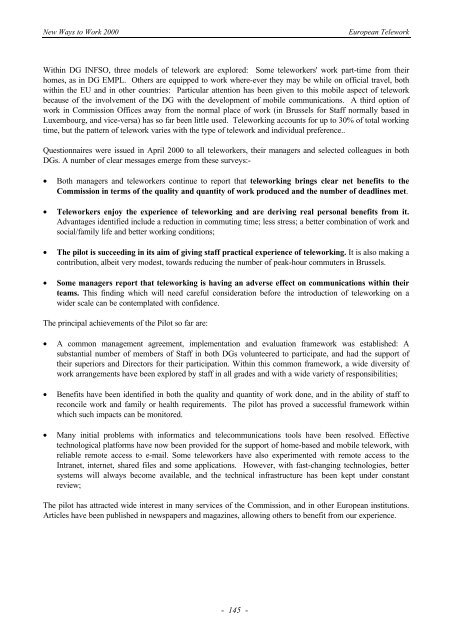eWORK 2000 - European Telework Week
eWORK 2000 - European Telework Week
eWORK 2000 - European Telework Week
- No tags were found...
You also want an ePaper? Increase the reach of your titles
YUMPU automatically turns print PDFs into web optimized ePapers that Google loves.
New Ways to Work <strong>2000</strong><strong>European</strong> <strong>Telework</strong>Within DG INFSO, three models of telework are explored: Some teleworkers' work part-time from theirhomes, as in DG EMPL. Others are equipped to work where-ever they may be while on official travel, bothwithin the EU and in other countries: Particular attention has been given to this mobile aspect of teleworkbecause of the involvement of the DG with the development of mobile communications. A third option ofwork in Commission Offices away from the normal place of work (in Brussels for Staff normally based inLuxembourg, and vice-versa) has so far been little used. <strong>Telework</strong>ing accounts for up to 30% of total workingtime, but the pattern of telework varies with the type of telework and individual preference..Questionnaires were issued in April <strong>2000</strong> to all teleworkers, their managers and selected colleagues in bothDGs. A number of clear messages emerge from these surveys:-• Both managers and teleworkers continue to report that teleworking brings clear net benefits to theCommission in terms of the quality and quantity of work produced and the number of deadlines met.• <strong>Telework</strong>ers enjoy the experience of teleworking and are deriving real personal benefits from it.Advantages identified include a reduction in commuting time; less stress; a better combination of work andsocial/family life and better working conditions;• The pilot is succeeding in its aim of giving staff practical experience of teleworking. It is also making acontribution, albeit very modest, towards reducing the number of peak-hour commuters in Brussels.• Some managers report that teleworking is having an adverse effect on communications within theirteams. This finding which will need careful consideration before the introduction of teleworking on awider scale can be contemplated with confidence.The principal achievements of the Pilot so far are:• A common management agreement, implementation and evaluation framework was established: Asubstantial number of members of Staff in both DGs volunteered to participate, and had the support oftheir superiors and Directors for their participation. Within this common framework, a wide diversity ofwork arrangements have been explored by staff in all grades and with a wide variety of responsibilities;• Benefits have been identified in both the quality and quantity of work done, and in the ability of staff toreconcile work and family or health requirements. The pilot has proved a successful framework withinwhich such impacts can be monitored.• Many initial problems with informatics and telecommunications tools have been resolved. Effectivetechnological platforms have now been provided for the support of home-based and mobile telework, withreliable remote access to e-mail. Some teleworkers have also experimented with remote access to theIntranet, internet, shared files and some applications. However, with fast-changing technologies, bettersystems will always become available, and the technical infrastructure has been kept under constantreview;The pilot has attracted wide interest in many services of the Commission, and in other <strong>European</strong> institutions.Articles have been published in newspapers and magazines, allowing others to benefit from our experience.- 145 -








